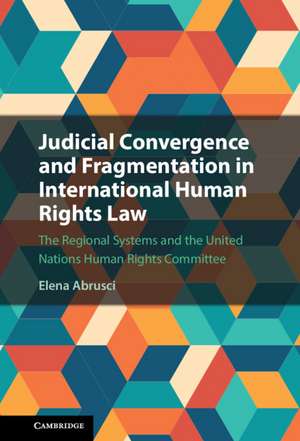Judicial Convergence and Fragmentation in International Human Rights Law: The Regional Systems and the United Nations Human Rights Committee
Autor Elena Abruscien Limba Engleză Hardback – 4 ian 2023
Preț: 593.22 lei
Preț vechi: 651.89 lei
-9% Nou
Puncte Express: 890
Preț estimativ în valută:
113.51€ • 118.76$ • 94.30£
113.51€ • 118.76$ • 94.30£
Carte disponibilă
Livrare economică 13-27 martie
Livrare express 26 februarie-04 martie pentru 34.92 lei
Preluare comenzi: 021 569.72.76
Specificații
ISBN-13: 9781316514818
ISBN-10: 1316514811
Pagini: 256
Dimensiuni: 152 x 229 x 19 mm
Greutate: 0.58 kg
Editura: Cambridge University Press
Colecția Cambridge University Press
Locul publicării:Cambridge, United Kingdom
ISBN-10: 1316514811
Pagini: 256
Dimensiuni: 152 x 229 x 19 mm
Greutate: 0.58 kg
Editura: Cambridge University Press
Colecția Cambridge University Press
Locul publicării:Cambridge, United Kingdom
Cuprins
Part I. Introducing and Assessing Fragmentation and Convergence in International Human Rights Law: 1. Fragmentation and convergence: context and definitions; 2. Assessing and exploring judicial fragmentation in international human rights law; Part II. Factors Explaining Judicial Convergence and Fragmentation: 3. The theory of treaty interpretation and judicial dialogue; 4. The composition of the courts and other adjudicative bodies and the role of their secretariats; 5. Calibrating judicial scrutiny: the notions of necessity and proportionality; 6. Deference, subsidiarity and regional consensus: the margin of appreciation doctrine; 7. Outside the courtroom: the role of NGOs and the obstacles to litigation.
Notă biografică
Descriere
An assessment of judicial convergence and fragmentation in international human rights law and their legal and non-legal triggering factors.
